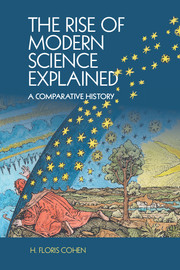Crossref Citations
This Book has been
cited by the following publications. This list is generated based on data provided by Crossref.
Wilson, Adrian
2017.
Science’s Imagined Pasts.
Isis,
Vol. 108,
Issue. 4,
p.
814.
Helmers, Helmer J.
and
Janssen, Geert H.
2018.
The Cambridge Companion to the Dutch Golden Age.
Buyse, Filip A. A.
2019.
Encyclopedia of Renaissance Philosophy.
p.
1.
Blockmans, Wim
2020.
Missions of Universities.
Vol. 55,
Issue. ,
p.
31.
Mertens, Thomas
2020.
A Philosophical Introduction to Human Rights.
Bala, Arun
2020.
Chinese organic materialism and modern science studies: Rethinking Joseph Needham’s legacy.
Cultures of Science,
Vol. 3,
Issue. 1,
p.
62.
Verwaal, Ruben E.
2020.
Encyclopedia of Early Modern Philosophy and the Sciences.
p.
1.
Mayrhofer, Roland
Kuhbandner, Christof
and
Lindner, Corinna
2021.
The Practice of Experimental Psychology: An Inevitably Postmodern Endeavor.
Frontiers in Psychology,
Vol. 11,
Issue. ,
Buyse, Filip A. A.
2022.
Encyclopedia of Renaissance Philosophy.
p.
2262.
Kink, Sabine
2022.
The Explanations of Snow in theTaixi shuifa泰西水法 (Hydromethods of the Great West, 1612) and Their Reception beyond the Ming–Qing Transition.
Monumenta Serica,
Vol. 70,
Issue. 1,
p.
165.
Scheidel, Walter
2022.
Non-Archimedean modernities.
Interdisciplinary Science Reviews,
Vol. 47,
Issue. 3-4,
p.
520.
Verwaal, Ruben E.
2022.
Encyclopedia of Early Modern Philosophy and the Sciences.
p.
184.
Cabello, Matias
2023.
The Counter-Reformation, Science, and Long-Term Growth: A Black Legend?.
SSRN Electronic Journal,
Stuart-Fox, Martin
2023.
Major Transitions in Human Evolutionary History.
World Futures,
Vol. 79,
Issue. 1,
p.
29.





